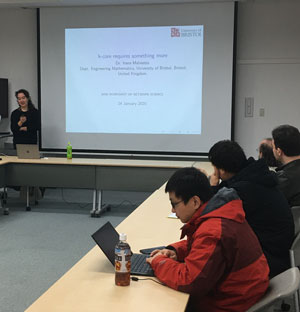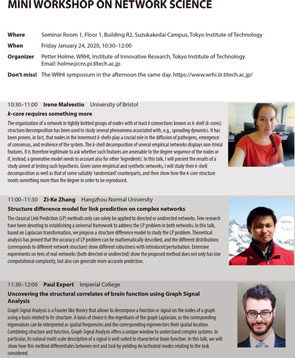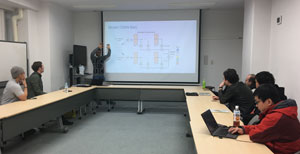TOP > News > MINI WORKSHOP ON NETWORK SCIENCE(January 24, 2020)
News
| Date | Friday January 24, 2020, 10:30-12:00 |
| Venue | Seminar Room 1, Floor 1, Building R2, Suzukakedai Campus, Tokyo Institute of Technology |
| Number of people | 15 |
| 10:30~11:00 | Irene Malvestio(University of Bristol) |
|
|
|
| 11:00~11:30 | Zi-Ke Zhang(Hangzhou Normal University) |
 Structure difference model for link prediction on complex networks Structure difference model for link prediction on complex networksThe classical Link Prediction (LP) methods only can solely be applied to directed or undirected networks. Few research have been devoting to establishing a universal framework to address the LP problem in both networks. In this talk, based on Laplacian transformation, we propose a structure difference model to study the LP problem. Theoretical analysis has proved that the accuracy of LP problem can be mathematically described, and the different distributions (corresponds to different network structure) show different robustness with introduced perturbation. Extensive experiments on tens of real-networks (both directed or undirected) show the proposed method does not only has low computational complexity, but also can generate more accurate prediction. |
|
| 11:30~12:00 | Paul Expert(Imperial College) |
 Uncovering the structural correlates of brain function using Graph Signal Analysis Uncovering the structural correlates of brain function using Graph Signal AnalysisGraph Signal Analysis is a Fourier like theory that allows to decompose a function or signal on the nodes of a graph using a basis related to its structure. A basis of choice is the eigenbasis of the graph Laplacian, as the corresponding eigenvalues can be interpreted as spatial frequencies and the corresponding eigenvectors their spatial location. Combining structure and function, Graph Signal Analysis offers a unique window to understand complex systems. In particular, its natural multi scale description of a signal is well suited to characterise brain function. In this talk, we will show how this method differentiates between rest and task by yielding de/activated modes relating to the task considered. |
|
Prof. Yasuharu Koike(Intelligent Information Processing Research Core)

|
 |
 |